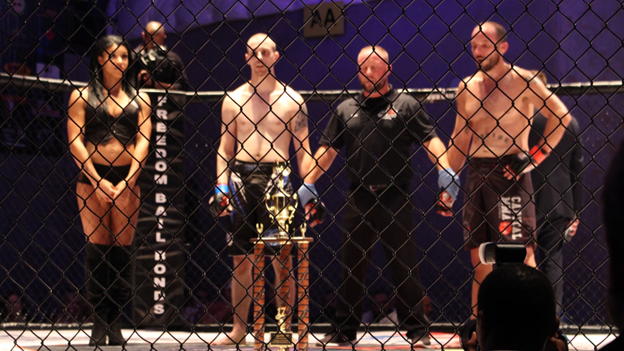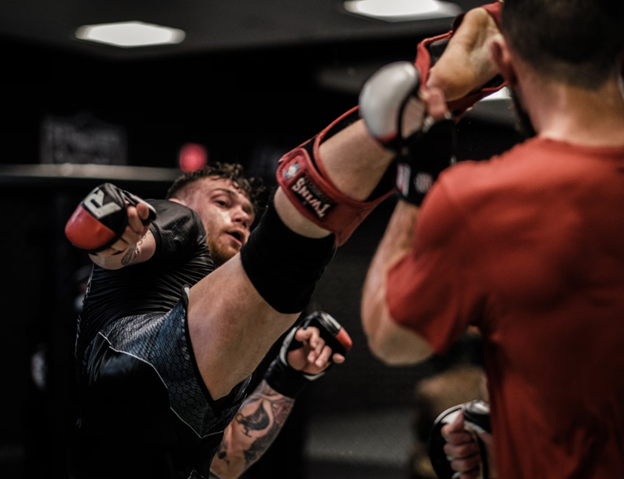In the intensely competitive world of mixed martial arts (MMA), comprehensive training and conditioning are not just beneficial; they are essential. Elite fighters understand that success in the octagon requires more than brute strength or technical skill alone—it demands peak physical conditioning, a strategic approach to nutrition, and a fortified mental state.
This holistic approach ensures that fighters are well-prepared to navigate the rigors of combat, where leveraging every advantage is crucial. Just as top-tier UFC fighters meticulously prepare for their battles, you can apply similar strategies to your betting decisions. Embrace this comprehensive preparation and bet confidently on https://betswap.gg/sports/ with unbeatable options, ensuring you’re as ready as the fighters stepping into the octagon.
Physical Preparation
Strength Training
Strength training is a cornerstone of MMA fitness, crucial for enhancing the power and endurance required in the cage. Typical strength training for MMA includes exercises like deadlifts, squats, and bench presses, which build core stability and overall muscle strength. Advanced routines often incorporate plyometrics and Olympic lifts to improve explosive power and speed, directly translating into more effective strikes and takedowns during a fight.
Cardiovascular Fitness
Cardiovascular fitness is essential for maintaining stamina through the intense rounds of an MMA bout. Fighters often engage in high-intensity interval training (HIIT) to simulate the burst-rest patterns experienced in a fight. Activities, such as sprinting, cycling, and circuit training are common, aiming to enhance the heart’s ability to deliver oxygen efficiently and sustain high energy levels throughout the duration of the match.
Flexibility and Mobility
Flexibility and mobility work is equally important, helping fighters maintain a range of motion and prevent injuries. Regular stretching, yoga, and dynamic warm-ups are integral to an MMA training regimen, improving agility and enabling fighters to execute a wide array of movements from strikes to evasions smoothly. This aspect of training helps minimize the risk of common injuries such as strains and sprains, keeping fighters agile and effective in their movements.
Nutritional Strategies
Dietary Basics for Fighters
Proper nutrition is crucial for MMA fighters to maintain peak physical condition and performance. Here are the key components of an MMA fighter’s diet:
- Macronutrient Balance: Ensuring the right balance of proteins, carbohydrates, and fats to fuel intense workouts and aid recovery.
- Hydration: Maintaining optimal hydration levels to support metabolic functions and enhance performance.
- Meal Timing: Aligning food intake with training sessions to maximize energy levels and recovery.
Weight Management
Weight management is vital for fighters to compete in their weight class effectively. Top strategies include:
- Caloric Deficit for Weight Cutting: Implementing a controlled caloric deficit when necessary while ensuring nutrient intake remains sufficient.
- Gradual Weight Loss: Focusing on losing weight gradually to avoid performance loss and health risks.
- Rehydration Strategies: Effective rehydration methods post-weigh-in to recover from weight cutting without compromising performance.
Supplementation
Supplements can play a supportive role in an MMA fighter’s nutrition regimen. Here’s how:
- Protein Supplements: To aid muscle recovery and growth.
- Creatine: For improving strength and power output during intense training.
- BCAAs (Branched-Chain Amino Acids): To support muscle recovery and reduce fatigue during prolonged training sessions.
Mental Preparation
Psychological Resilience
Mental toughness is a cornerstone of a fighter’s training regimen. In MMA, the ability to stay focused and determined despite the pressures and pains of combat can make the difference between a win and a loss. Techniques, such as visualization, positive self-talk, and routine mental rehearsals, are commonly used to build this resilience, preparing fighters to face any challenge in the octagon.
Focus and Concentration Techniques
Maintaining focus before and during bouts is critical for performance. Fighters often employ mindfulness meditation, focused breathing exercises, and concentration drills to enhance their mental clarity. These techniques help them stay present in the moment, avoid distractions, and execute their strategies effectively during high-pressure fights.
Stress Management
Managing pre-fight stress and anxiety is vital for optimal performance. Fighters use a variety of methods to control stress levels, including yoga, progressive muscle relaxation, and cognitive-behavioral strategies. By learning to manage their emotions effectively, fighters can keep anxiety at bay, enter the ring with confidence, and maintain composure throughout the fight.
Case Study: A Top Fighter’s Regimen
Conor McGregor, known for his rigorous training and disciplined diet, follows a highly structured regimen. His training schedule typically includes two sessions a day focusing on various aspects of MMA, such as striking, grappling, and strength conditioning.
Training Schedule:
- Morning Session: High-intensity interval training (HIIT) or cardio, followed by technical drills and sparring.
- Afternoon Session: Strength and conditioning workouts, incorporating weightlifting, plyometrics, and flexibility exercises.
Diet:
- High Protein Intake: McGregor’s diet includes lean meats, fish, and eggs to support muscle recovery and growth.
- Complex Carbohydrates: Foods like sweet potatoes, brown rice, and quinoa to provide sustained energy.
- Healthy Fats: Sources such as avocados, nuts, and olive oil for overall health and energy.
McGregor also emphasizes hydration and often uses supplements like protein shakes and amino acids to maintain peak physical condition. Additionally, he incorporates multivitamins and omega-3 fatty acids into his regimen to support overall health and optimize his physical and mental performance.
The Role of Coaching and Support Teams
Skilled coaching is fundamental to the success of any MMA fighter. A coach not only imparts technical skills but also plays a crucial role in strategizing and mental preparation.
Effective coaches tailor their training programs to the fighter’s unique strengths and weaknesses, ensuring a holistic development approach. For example, renowned coach John Kavanagh has been pivotal in Conor McGregor’s career, focusing on enhancing his striking skills and developing comprehensive game plans for his fights. Key elements of a skilled coach’s influence include:
- Technical Expertise: Providing in-depth knowledge of various fighting styles and techniques.
- Strategic Planning: Crafting fight strategies based on opponent analysis and fighter capabilities.
- Mental Preparation: Building psychological resilience and confidence through motivational techniques and mental conditioning.
Medical and Science Support
Sports science has revolutionized the way MMA fighters train and recover. Incorporating scientific methods into training regimens helps optimize performance and minimize injury risks. Nutritionists, physiotherapists, and sports scientists work together to create tailored plans that enhance a fighter’s physical capabilities.
Key Contributions of Sports Science
- Injury Prevention and Management: Advanced physiotherapy techniques and regular health assessments to prevent and manage injuries.
- Performance Analysis: Using technology such as motion capture and biomechanical analysis to refine techniques and improve efficiency.
- Recovery Protocols: Implementing recovery strategies like cryotherapy, hyperbaric oxygen therapy, and massage therapy to accelerate healing and reduce downtime.
For instance, McGregor’s team includes a dedicated nutritionist, George Lockhart, who customizes his diet to optimize performance and recovery. Lockhart tailors meal plans and hydration strategies specifically for McGregor’s training phases and fight preparations, ensuring that his nutritional needs are meticulously met.
Family and Managerial Support
The support from family and a professional management team is often the backbone of a fighter’s career. Family support provides emotional stability and motivation, while a professional management team handles logistics, sponsorships, and career planning, allowing fighters to focus on training and competition.
Benefits of Strong Support Networks
- Emotional Stability: Family and close friends offer emotional support, reducing stress and boosting morale.
- Career Management: Managers and agents handle contractual negotiations, sponsorship deals, and media relations, ensuring that fighters can concentrate on their performance.
- Holistic Support: Personal and professional networks collaborate to address all aspects of a fighter’s life, from financial planning to mental well-being.
For example, Khabib Nurmagomedov’s success is partly attributed to his strong family support system. It included his late father, Abdulmanap Nurmagomedov, who was also his coach and mentor.
Concluding Remarks
In the demanding world of MMA, comprehensive training and conditioning are key to success. Elite fighters like Conor McGregor exemplify the integration of rigorous physical training, strategic nutrition, and robust mental preparation. The support from skilled coaches, medical teams, and personal networks further enhances their performance.
By adopting these holistic strategies, fighters not only optimize their abilities but also sustain their careers in the highly competitive arena of MMA. Emulating these principles can significantly improve one’s approach to both training and competition, ensuring readiness for any challenge.


